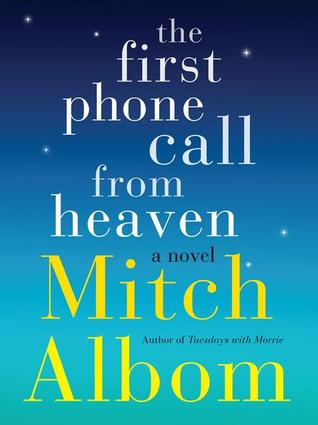The First Phone Call from Heaven
by Mitch Albom (Goodreads Author)
The First Phone Call from Heaven tells the story of a small town on Lake Michigan that gets worldwide attention when its citizens start receiving phone calls from the afterlife. Is it the greatest miracle ever or a massive hoax? Sully Harding, a grief-stricken single father, is determined to find out. An allegory about the power of belief--and a page-turner that will touch your soul--Albom's masterful storytelling has never been so moving and unexpected.
Readers of The Five People You Meet in Heaven will recognize the warmth and emotion so redolent of Albom's writing, and those who haven't yet enjoyed the power of his storytelling, will thrill at the discovery of one of the best-loved writers of our time.(less)
Readers of The Five People You Meet in Heaven will recognize the warmth and emotion so redolent of Albom's writing, and those who haven't yet enjoyed the power of his storytelling, will thrill at the discovery of one of the best-loved writers of our time.(less)
Hardcover, 323 pages
Published November 12th 2013 by Harper
mitchalbom.com
Grace Prosniewski
Daily Arts WriterNovember 22nd, 2013
Printed from www.michigandaily.com on Wed, 27 Nov 2013 15:31:13 -0500
'First Phone Call from Heaven' balances science, belief with finesse
Grace Prosniewski
Daily Arts WriterNovember 22nd, 2013
Mitch Albom made the jump from sports columnist to best-selling author through works like “Tuesdays with Morrie,” “The Five People You Meet in Heaven” and “The Time Keeper.” His newest novel, “The First Phone Call from Heaven,” continues in the same vein of its predecessors, examining the complex issues of grief, belief and hope with the warmth and heart we’ve come to expect from Albom.
The novel revolves around the various residents of the small northern Michigan town of Coldwater (not to be confused with the real town of Coldwater, located in Branch County). It’s a typical, quiet small town.
That is, until residents begin receiving phone calls from what sounds like deceased loved ones. No one’s quite sure whether to think these calls are a miracle or a hoax. Before long, the outside world finds out about the phenomenon, and masses of people — believers and skeptics alike — flock to Coldwater.
Much of the story is told from the perspective of disgraced ex-pilot Sully Harding. At the beginning of the story, Sully has just been released from prison, serving a 10-month sentence related to the plane crash he was in the night his wife ended up in a coma and eventually died. Returning to his hometown of Coldwater, a grieving Sully finds himself surrounded by messages of heaven and the afterlife. When Sully finds out his young son is carrying around a toy phone in hopes that his mother will call him from heaven, he devotes himself entirely to disproving the calls.
The skeptical Sully serves as a nice foil to the enthusiasm of the rest of the town and keeps the story from straying too far from reality. This is Albom’s first work that plays out as a real “whodunit” mystery, using Sully as lead investigator and representative of the reader. In general, Albom succeeds in this foray.
Interspersed throughout the narrative are bits and pieces of information about the life of Alexander Graham Bell and the 1876 invention of the telephone. You might think these interludes would disrupt the flow of the story, but Albom smoothly handles the transitions, working them to his advantage in furthering the plot. Plus, you learn a lot of really interesting facts about Bell. For instance, his wife Mabel Hubbard was completely deaf due to a near fatal bout of scarlet fever. Crazy!
The book’s a bit longer than Albom’s other novels. It’s not an arduous read, though, as it relies heavily on dialogue and uses short, to-the-point descriptions.
There’s a reason Albom’s works stay on best-seller lists for weeks on end; he’s an engaging writer. There are no frills or long, flowery intervals (impressive since most of his works have a theological slant). There’s a spark in the simplicity of his writing that keeps his work dynamic. The longer length of “The First Phone Call from Heaven” allows for some nice character development, shown primarily through the evolving relationships of the townspeople. There’s also a good critique of extremism on both sides of the religion-versus-science debate, as the two camps consume the small town in conflict.
The only problematic aspect of the story is its supposedly ambiguous ending. A novel dealing with the concepts of heaven and belief almost needs to end in uncertainty; of course no one knows what happens after death. While Albom tries to play up this ambiguity, culminating in a singular event, I found the incident too easily explained away by previous events in the novel. It’s not quite the spinning top at the end of “Inception.”
If you’ve enjoyed his previous works, chances are you’re going to like “The First Phone Call from Heaven.” If, however, you don’t count yourself an Albom fan, this will not be the one to change your mind.
Printed from www.michigandaily.com on Wed, 27 Nov 2013 15:31:13 -0500

No comments:
Post a Comment